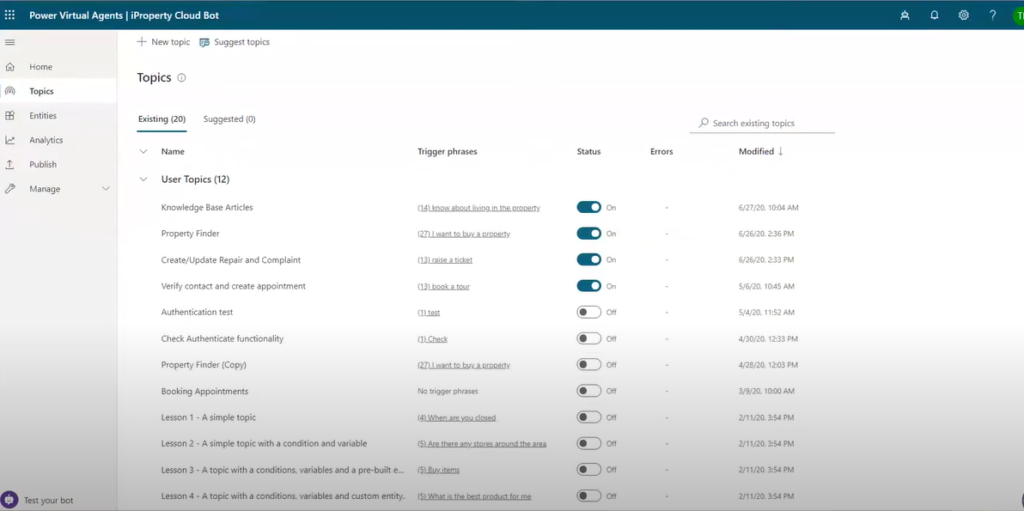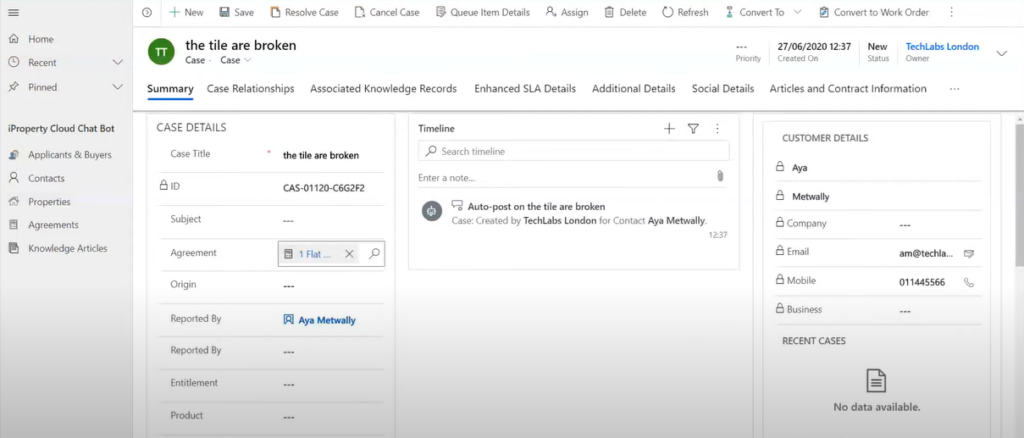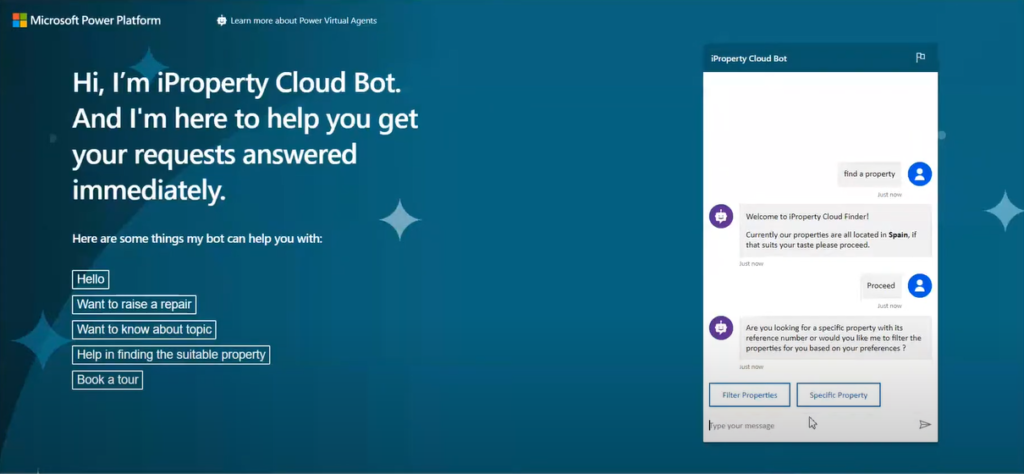Technology plays an integral part in modern industries. One area where AI capabilities could prove particularly beneficial is in real estate firms using Microsoft Dynamics 365 CRM with AI capabilities for operations transformation and customer experience enhancement. In this blog post, we will explore Microsoft Dynamics 365 CRM AI’s abilities within real estate firms and chatbot replacement to streamline processes and increase efficiency.
The capabilities of AI in Microsoft Dynamics 365 CRM
Microsoft Dynamics 365 CRM’s advanced AI capabilities could transform the real estate industry. Boasting features like chatbots and virtual agents with power automation capabilities, companies can automate various tasks, enhance customer interactions, and increase overall efficiency with this solution.
Real estate has traditionally relied on human interactions and manual processes for tasks like lead management, customer service, and property management. Thanks to technology and AI advancements, companies can automate these processes and save both time and money by streamlining them.
Chatbots
Microsoft Dynamics 365 CRM leverages one of its key AI features – chatbots – as one of its main AI capabilities for property business use. Chatbots are computer programs designed to mimic human conversations and naturally converse with customers. When used within property businesses, chatbots can handle routine inquiries, respond quickly to frequently asked questions, and assist customers in finding suitable properties.
Chatbots can be easily integrated with a company’s website or messaging platform. They allow customers to interact with them in real-time, providing information about available properties, setting appointments for viewings, and aiding negotiation processes. Their automation can free staff time so they can focus on more strategic actions for the benefit of the business.
Virtual Agents
Microsoft Dynamics 365 CRM’s AI capabilities extend beyond chatbots to virtual agents as part of its AI capabilities. Virtual agents are digital assistants powered by AI that can handle more complex interactions between customers and digital assistants, for instance, understanding natural language queries or analysing customer needs to offer customized suggestions or solutions.

Virtual agents in the real estate market assist customers in their property search by understanding their preferences, budgets, and requirements for location. Virtual agents can then find suitable properties, give more information about an area, and assist with applying for a mortgage loan – significantly improving customer service by offering quick response times, 24/7 availability, and personalized advice.
Power Automation
Microsoft Dynamics 365 CRM’s artificial intelligence feature of power automation offers businesses another AI tool to increase productivity while decreasing human errors. Real estate firms can use power automation by creating workflows and processes to streamline operations and increase efficiency.

Power automation can be utilized to automate lead qualification and distribution processes. Once a lead is generated, this system can allocate it to the best salesperson based on predefined guidelines, saving time and ensuring leads are tracked promptly for follow-up.
Power automation can also help streamline property management tasks. For instance, when tenants submit maintenance requests, the system can automatically create the work order, assign it to the relevant technician, and send automatic notifications directly to tenants regarding their request status. Through automation, businesses can increase customer satisfaction while speeding response times.
Replace Human Agents with Chatbots
Thanks to advances in artificial intelligence and natural language processing technologies, chatbots have quickly become an invaluable asset to property professionals in recent years. Chatbots continue to develop more sophisticated features to assist and communicate with customers.
Chatbots in the real estate industry offer many advantages over human agents when handling multiple conversations simultaneously. While human agents can only take one customer at a time, chatbots are designed to handle multiple customer interactions simultaneously, allowing them to respond quickly to each potential customer contact.
Chatbots provide not only multifaceted conversations but also tailored assistance for every customer. Chatbots will use sophisticated algorithmic and data analytics techniques to learn about user preferences and budget constraints when providing home search recommendations.
If, for instance, a client wishes to find a two-bedroom house within their budget of 1500 dollars in a particular location, chatbots can quickly search all available properties before providing personalized recommendations that fit these criteria. Such tailored assistance increases user satisfaction and enriches overall user experiences.

Chatbots have many applications in real estate markets. For instance, they can help make sales by providing information about homes for sale, setting viewing appointments, and even helping with negotiations – streamlining the selling process while decreasing human involvement in sales transactions.
Booking appointments is another area in which chatbots excel. Instead of relying on humans to set appointments with prospective tenants and buyers, chatbots automate this process; users talk to the chatbot to search for open time slots and schedule meetings directly without back-and-forth messaging hassles.
Chatbots provide more than appointments and sales; they also offer virtual property tours that enable users to experience properties conveniently from their homes. This feature can significantly benefit buyers living far away or investors unable to physically visit the properties in person.
Customer service is another area where chatbots are invaluable. Chatbots can quickly address common inquiries, such as inquiries regarding property prices, availability, or pricing, with instant responses and efficiently resolve issues rapidly – this allows human agents to focus more on answering more intricate customer questions instead.
Chatbots are also effective at handling customer complaints quickly and efficiently, gathering feedback, addressing issues quickly, and escalating problems to human representatives when necessary. This ensures complaints are directed efficiently while making customers feel valued and respected.
Though chatbots offer numerous advantages in the real estate business, they should only partially replace human agents in expertise and emotions – two aspects not easily replicated by chatbots. Furthermore, more complex questions or negotiations might necessitate human involvement.
Chatbots have proven themselves an indispensable asset to realtors and real estate companies. Not only can they handle multiple conversations simultaneously, offering personalized assistance and collecting customer data that matches property searches, but chatbots can also assist with sales, appointment booking, viewing properties, customer services support, complaint resolution, and sales. Thanks to AI/NLP, chatbots are revolutionizing how the real estate industry operates!
Virtual Agents: Revolutionizing Customer Service
Virtual agents’ effectiveness at improving customer service cannot be overstated. Representing the next generation of chatbot technology, virtual agents have vastly superior capabilities to previous chatbots in providing sophisticated capabilities and increasing customer satisfaction. Furthermore, these revolutionary virtual agents could transform companies’ interactions with their customers by providing personalized attention, speedy responses to individual concerns or issues, seamless integration into other tools via Power Automate, and seamless integration into Power Automate. This blog post will outline their significant advantages and capabilities over other chatbots.
Advanced capabilities for Personalized Interactions
Virtual agents stand out from other chatbots because of their superior capabilities. Designed to intelligently respond to specific concerns or fix issues quickly and provide tailored solutions for clients, using natural machine learning and language processing techniques, virtual agents offer relevant and accurate details in response to questions posed to them, making the customer’s interactions with these virtual assistants both efficient and meaningful.
Virtual agents can quickly adjust to the changing preferences of users over time, keeping track of customer preferences and tailoring responses accordingly.

Utilizing data analytics and behavioral habits, virtual agents are also equipped to make educated decisions regarding how best to communicate with customers – creating personalized interactions that instill trust between business and customers alike.
Improving Customer Satisfaction
Customer satisfaction should always be at the core of a company’s operations, and virtual agents play an essential role in meeting this objective. Traditional chatbots may fail to provide satisfactory customer service due to limited capabilities or the incapability to understand complex queries. Still, virtual agents excel at satisfying customer demands and exceeding customer expectations.
Virtual agents can handle various inquiries precisely and promptly, providing precise responses. Their advanced capabilities allow them to take more complex interactions like resolving technical issues, helping customers through repair processes efficiently, and providing top-quality customer service – ultimately reducing client frustration and an enjoyable customer journey experience.
Seamless Integration Power Automate
Virtual agents can be integrated seamlessly with other systems through Power Automate, an advanced automated workflow tool. This enables seamless data exchange and connectivity between virtual agents and various business applications such as Customer relationship management systems (CRM), knowledge bases, or ticketing software.
Integrating virtual agents into Power Automate enables businesses to automate various processes and tasks that simplify customer service operations, for instance, creating ticket support alerting human agents of complex issues or pulling relevant data from knowledge databases. This integration level enables companies to provide better and faster customer support services, which ultimately leads to an enhanced experience for them and increases customer satisfaction.
Measurement of Customer Satisfaction and analysis of conversations
Customer satisfaction is of utmost importance in any company, and thanks to advances in technology, chatbots have become a convenient way for them to communicate with their customers and offer immediate help. Not only are chatbots effective customer service agents, but they can also help measure satisfaction among customers while improving overall experiences for them.
Measurement of the satisfaction of customers
One of the primary advantages of chatbots is their ability to assess customer satisfaction on a scale from 1-5. Following each interaction with the bot, users can rate their experiences using it; their feedback provides invaluable insight into whether customers are happy with the services.
Companies can leverage customer ratings to identify areas for improvement and make adjustments that will increase customer satisfaction. For instance, if a chatbot consistently receives low marks in specific categories such as speed of response or precision ratings, the company could focus on improving these areas to offer customers an improved experience.
Analyzing Conversations and Trigger Phrases
Chatbots provide businesses with another valuable way of measuring customer satisfaction: analysis of conversations between chatbots and customers. By doing this, businesses gain insights into customers’ habits, preferences, and areas of concern.
One effective strategy for analyzing conversations is using trigger terms. Trigger words are keywords or phrases frequently utilized during chatbot interactions, enabling businesses to comprehend client expectations and requirements better.
Clients frequently mentioning “product returned” could indicate issues with product return policy or returns management, which can help businesses identify any problems and enhance procedures and products accordingly. By analyzing trigger words, companies can identify potential issues and then take measures to address these effectively.
Companies can improve chatbot efficiency by looking at frequently used words. Companies can enhance the chatbot knowledge base by identifying customer issues or questions that often arise. Hence, it provides more precise and pertinent answers, improving customer experiences and lessening frustrations.
Distinguishing Sessions Abandoned
Abandoned sessions occur when conversations between customers and chatbots become interrupted or cut off unexpectedly, potentially harming user experiences as customers may need to review or renew concerns or voice questions whenever reconnecting with chatbots again.
Businesses must act quickly to resolve abandoned sessions for optimal user experiences, with session persistence being one solution. In essence, this means the chatbot retains its conversations even when interrupted; this enables users to quickly resume discussions without re-engaging with previous ones.
Companies can implement preventative measures to combat abandoning sessions, for instance, by having their chatbot send automated messages if a customer’s session goes dormant for too long and see whether there are any further issues or needs for assistance from users.
By responding quickly and appropriately to abandoned sessions, businesses can create an enhanced user experience and increase customer satisfaction.
Integration with SAP and Other Systems
Microsoft Dynamics 365 CRM integrates with SAP through connectors like Tab and SAP connectors, making it possible for real estate firms to connect their chatbots with other systems, providing efficient data exchange and streamlining processes. The low code, no-creating chatbots feature enables businesses to build and deploy bots without programming knowledge.
Integrating Microsoft Dynamics 365 CRM with SAP and other systems opens many new doors for real estate firms. Businesses can streamline processes through these connections while increasing data accuracy for an improved customer experience.
What are the reasons for integrating Microsoft Dynamics 365 CRM with SAP?

Real estate companies generate vast amounts of data gathered from various sources, such as property listings, customer requests, financial transactions, etc. To effectively manage this information, companies require an effective system that can handle complex operations while automating processes and providing real-time data.
Microsoft Dynamics 365 CRM provides an expansive suite of tools designed specifically to address the property market, with modules for property management, marketing and sales, customer support, and finance – though many businesses also rely on SAP.
Integrating Microsoft Dynamics 365 CRM and SAP allows companies to capitalize on both systems’ strengths. Connectors offered by Microsoft allow for seamless data transfers between platforms, ensuring accurate and up-to-date information across both.
Benefits of Integration
There are a variety of advantages of the integration of Microsoft Dynamics 365 CRM with SAP and other systems:
- Efficient data exchange Integration enables live data syncing between Microsoft Dynamics 365 CRM and SAP, eliminating manual data entry while reducing risks such as mistakes and inconsistencies. If an asset is marked new in Microsoft Dynamics 365 CRM, SAP updates accordingly to ensure all financial records remain up-to-date.
- Streamlined Processes Businesses can streamline operations and reduce manual workload by automating system data transfers. For example, when someone makes a transaction within SAP, it will automatically be updated into Microsoft Dynamics 365 CRM to update balances and trigger any follow-up actions as part of an individual’s account activity.
- Improved Customer Experiences Integration enables companies to enhance the customer experience by ensuring a steady stream of accurate information. Agents can better deal with inquiries more efficiently as all pertinent information can be accessed easily at one location; this expedites response times and enhances customer satisfaction.
- Real-Time Insights Associating data from Microsoft Dynamics 365 CRM and SAP can give businesses valuable insight into their operations. Dashboards and reports can be tailored to provide a holistic picture of the company that allows for informed decision-making and proactive planning – for instance; real-estate firms can examine sales performance by region, type of property, or customer segment to spot trends that help inform marketing strategy improvements.
No Code (Low Code) Chatbot Creation
Microsoft Dynamics 365 CRM features integration capabilities and provides an automated chatbot creation service with minimal or no code necessary. Businesses can quickly create and deploy chatbots without extensive programming knowledge or hiring expensive developers.
Businesses using low/no code chatbot creation options can quickly build intelligent virtual assistants to assist customers with property inquiries and transactions, provide personalized suggestions, and even help in transactions. Chatbots are easily integrated into Microsoft Dynamics 365 CRM, SAP, and other systems for an effortless customer experience.
Low-code/no-code approaches make Chatbot creation more accessible to businesses. Non-technical users can quickly utilize visual editors and templates to design conversational flow designs with intent/entity definition, then develop the chatbot using algorithmic machine learning technology.
Once a chatbot is developed, it can be deployed through various channels, including websites, messaging apps, and devices with voice capabilities. Real estate firms can utilize chatbots to streamline customer interactions while collecting valuable data that allows customizing sales and marketing strategies.
FAQ
Track, manage, and save information on potential customers with centralized data-based software.
Make use of sales monitoring to collect the most current performance information. Integrate sales data into your CRM software to present an immediate and accurate sales overview. With a live view of your sales pipeline, you’ll become aware of any delays and problems or when you receive a significant contract.
Automate workflows to streamline workflows. Develop sales proposals, collect customer feedback, and create email campaigns for task automation. This way, you simplify sales, marketing, and customer support. It helps reduce repetitive tasks so your team can focus on more critical activities.
Find and connect with the ideal customers. Predictive insights and data-driven buyer behavior help you understand how to target, identify, and make contact with the most qualified leads and convert those leads into buyers.
Improve the customer experience. With a complete picture of the client, every salesperson will be aware of a customer’s past and purchasing habits and any other information that can assist your team in providing the best service possible to each customer.
Improve your customers’ journey. With the ability to develop multichannel marketing campaigns that nurture prospects who are ready to sell by providing them with specific buyer experiences and integrating your teams using planning and live tracking tools, you’ll be capable of presenting targeted marketing strategies that appeal to your clients.
When you gain insights into your brand’s reputation and the marketplace through customized dashboards that analyze data, you can prioritize the leads that matter most to your business and quickly switch based on insights and business decisions fed by the results of automated, targeted processes.
Let sellers engage with their customers to comprehend their needs and win more business. Identifying the best customers and prospects using targeted sales strategies becomes more straightforward as your business expands. It leads to a more successful approach to following your pipeline’s next step.
A more brilliant sales strategy with embedded insight helps to build relationships, improve efficiency, boost sales performance, and create new ideas using a flexible and modern platform. By utilizing AI capabilities that assess past and current key indicators, you can keep track of customer relationships from start to finish and automate sales with contextual prompts that provide a personalized experience that aligns with your customer’s experience any time, wherever.
Microsoft Dynamics 365 offer customers an easy multichannel experience. Using robots to assist customers, customer service teams will have the equipment to provide value and increase engagement for every interaction. With personalized service offerings, agents can cross-sell or sell upsells using relevant, contextual information and feedback from surveys, feedback, or social monitoring. They can optimize their resource allocation based on current customer service trends.
In providing a well-organized, intelligent, efficient service available on every channel, customers can communicate with agents quickly and swiftly, resolve issues, and enjoy top-quality customer service.
Dynamics 365 CRM offers an adaptable and customizable solution tailored to your business needs. Select a stand-alone application that is suited to the requirements of a specific area of business or utilize multiple CRM software applications that function as a complete, robust solution.
Conclusion

Integrating Microsoft Dynamics 365 with SAP and other systems benefits real estate firms. From seamless data transfer, streamlining processes, and improving customer experiences – integration allows firms to streamline operations while remaining ahead of competitors.
With low-code/no-code chatbots, businesses can tap into the potential of virtual assistants without needing extensive coding expertise. Chatbots that integrate seamlessly with Microsoft Dynamics 365 and SAP real estate firms can improve customer engagement while increasing operational efficiencies.
Real estate companies that adopt integration tools can use them to unlock the total value of their information, streamline processes, and offer outstanding customer service.






